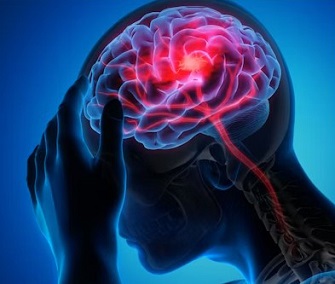Nikhil Prasad Fact checked by:Thailand Medical News Team Jul 03, 2024 9 months, 3 weeks, 1 day, 2 hours, 2 minutes ago
Medical News: Cerebral microbleeds (CMBs) are tiny brain lesions that can increase the risk of stroke and dementia. They have recently gained attention in the medical world, not only as indicators of small vessel disease (SVD) but also as potential precursors to serious neurological conditions. This
Medical News report covers a study review by researchers from the University of Missouri School of Medicine-USA that delves deeper into Cerebral microbleeds (CMBs).
 Cerebral Microbleeds Increases Risk Of Stroke Or Dementia
What Are Cerebral Microbleeds?
Cerebral Microbleeds Increases Risk Of Stroke Or Dementia
What Are Cerebral Microbleeds?
CMBs are small, round or oval-shaped dark spots visible on MRI scans of the brain. These spots are caused by tiny amounts of blood that have leaked from the brain's small blood vessels. The leaks are often due to problems with the brain's blood vessels, such as high blood pressure or amyloid plaques, which are protein deposits that can build up in the walls of blood vessels.
Why Should We Care About CMBs?
The presence of CMBs can indicate an increased risk of more serious brain issues, including:
-Stroke: Both hemorrhagic (bleeding in the brain) and ischemic (blockage of blood flow to the brain).
-Dementia: Conditions like Alzheimer’s disease can be linked to the presence of CMBs.
-Cognitive Decline: Issues with thinking, memory, and learning.
The Role of the Blood-Brain Barrier
One key factor in the development of CMBs is the dysfunction of the blood-brain barrier (BBB). The BBB is a protective shield that keeps harmful substances in the blood from entering the brain. When the BBB is damaged, it becomes "leaky," allowing blood components to escape into the brain tissue, causing CMBs.
High Blood Pressure and CMBs
High blood pressure (hypertension) is a major risk factor for CMBs. It can damage the small blood vessels in the brain, making them more likely to leak. This is why managing blood pressure is crucial for brain health.
Amyloid Plaques and CMBs
Amyloid plaques are another culprit. These are abnormal protein deposits that can build up in the walls of blood vessels, leading to a condition known as cerebral amyloid angiopathy (CAA). CAA can weaken blood vessels and make them more prone to bleeding, resulting in CMBs.
How Are CMBs Detected?
CMBs are usually detected using a special type of MRI scan called a T2*-weighted gradient recall echo (T2*-GRE) or susceptibility-weighted imaging (SWI). These scans are particularly good at highlighting the small dark spots that indicate the presence of CMBs.
The Connection to Dementia
CMBs are often found in older adults, and their presence can be an early sign of dementia. Stu
dies have shown that individuals with more CMBs are at a higher risk of developing conditions like Alzheimer’s disease. This makes early detection and monitoring of CMBs important in managing cognitive health.
The Impact of Diabetes
Diabetes, especially when poorly managed, can also increase the risk of CMBs. High blood sugar levels can damage blood vessels over time, contributing to the formation of CMBs. This underscores the importance of controlling blood sugar levels to protect brain health.
Preventing and Managing CMBs
While we can't always prevent CMBs, there are steps we can take to reduce the risk:
-Control Blood Pressure: Keep blood pressure within a healthy range through diet, exercise, and medication if necessary.
-Manage Diabetes: Keep blood sugar levels under control to prevent blood vessel damage.
-Healthy Lifestyle: Eat a balanced diet, exercise regularly, avoid smoking, and limit alcohol consumption.
-Regular Check-Ups: Routine medical check-ups can help monitor and manage risk factors for CMBs.
The Future of CMB Research
Research into CMBs is ongoing, and scientists are working to better understand how these tiny lesions contribute to larger brain health issues. Advances in imaging technology and a deeper understanding of the BBB are paving the way for new treatments and preventive strategies.
In conclusion, while cerebral microbleeds are small, their impact on brain health can be significant. By understanding what they are and how they develop, we can take steps to manage the risk factors associated with them and protect our brain health as we age.
The study review was published in the peer reviewed journal: Biomedicines.
https://www.mdpi.com/2227-9059/12/7/1463
For the latest about cerebral microbleeds, keep on logging to Thailand
Medical News.
Read Also:
https://www.thailandmedical.news/news/individuals-with-acute-ischemic-stroke-and-covid-19-showed-higher-rates-of-intracranial-bleeding-issues-and-worse-clinical-outcomes
https://www.thailandmedical.news/news/healthy-ethnic-asians-at--high-risk-of-brain-bleeds-from-taking-preventive-low-aspirin-doses
